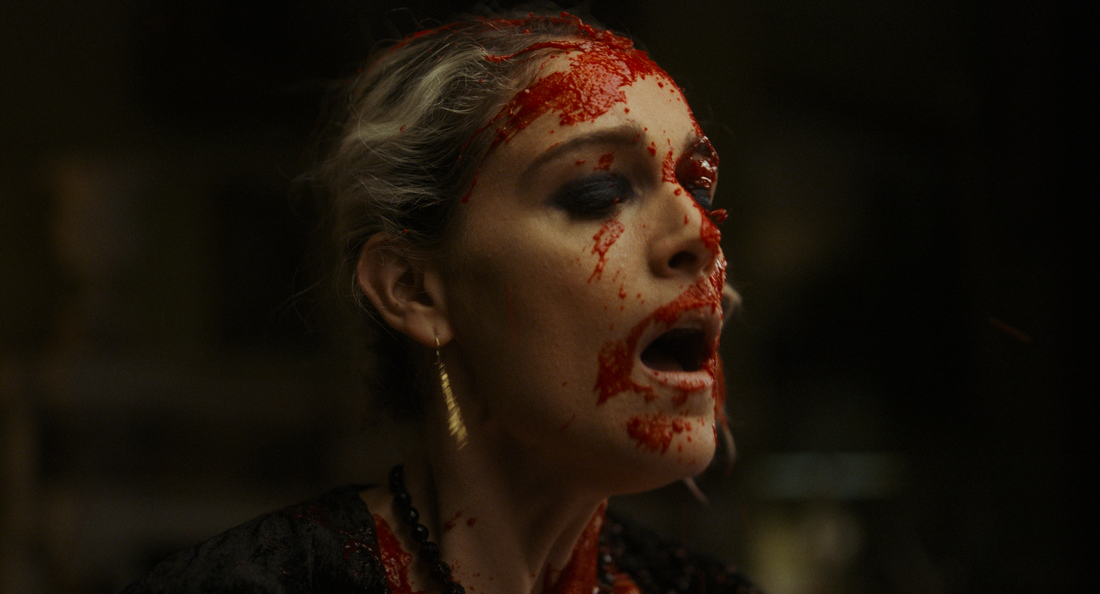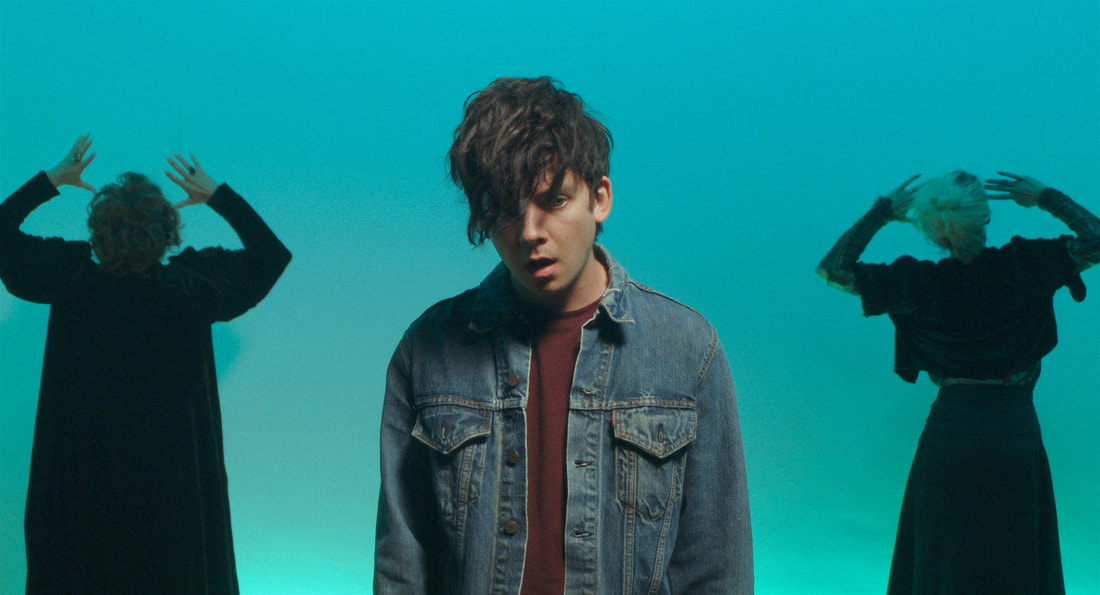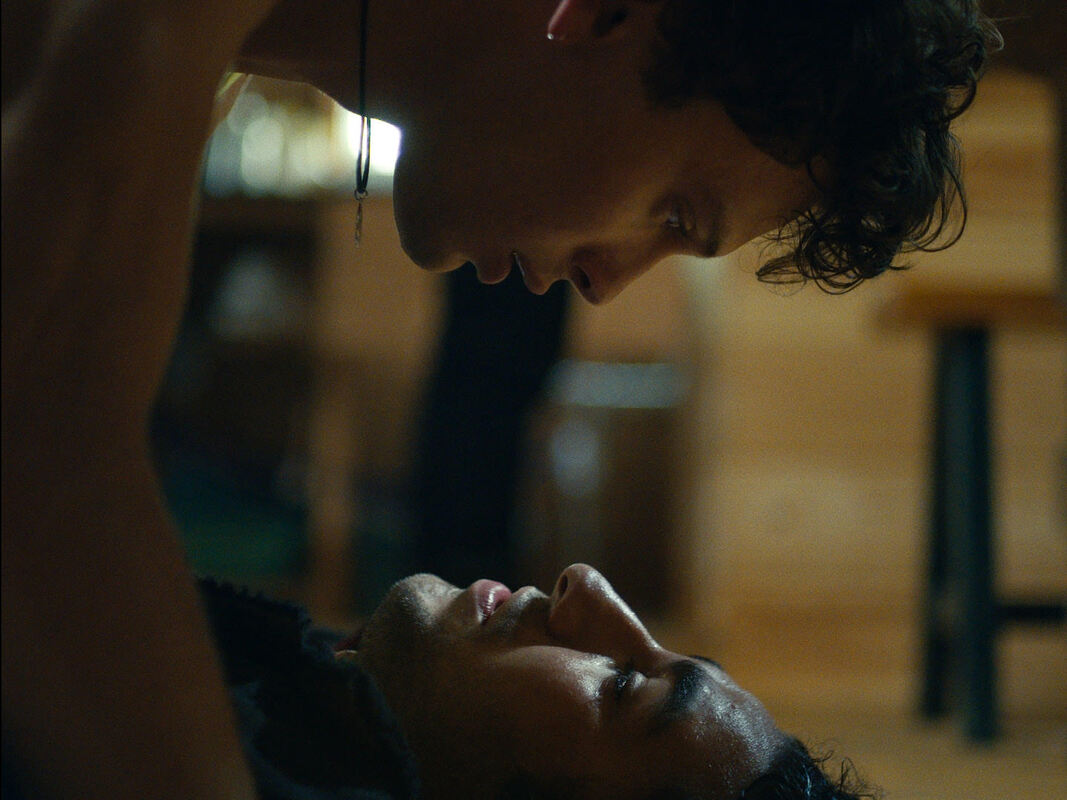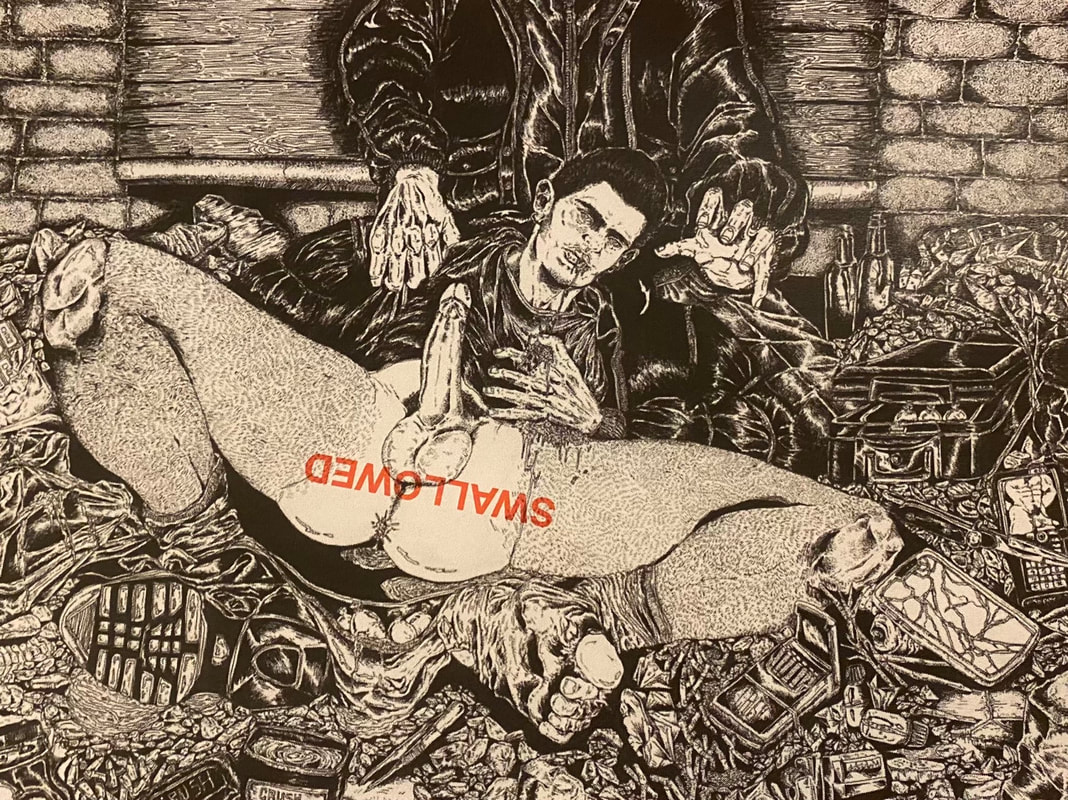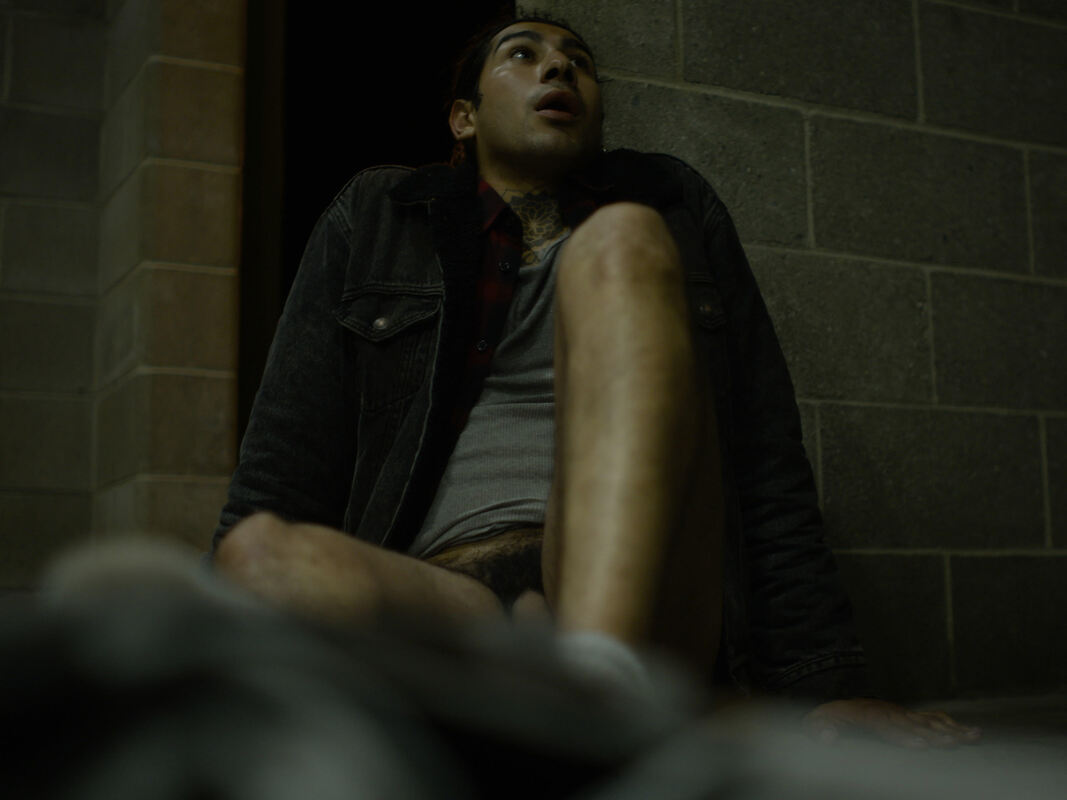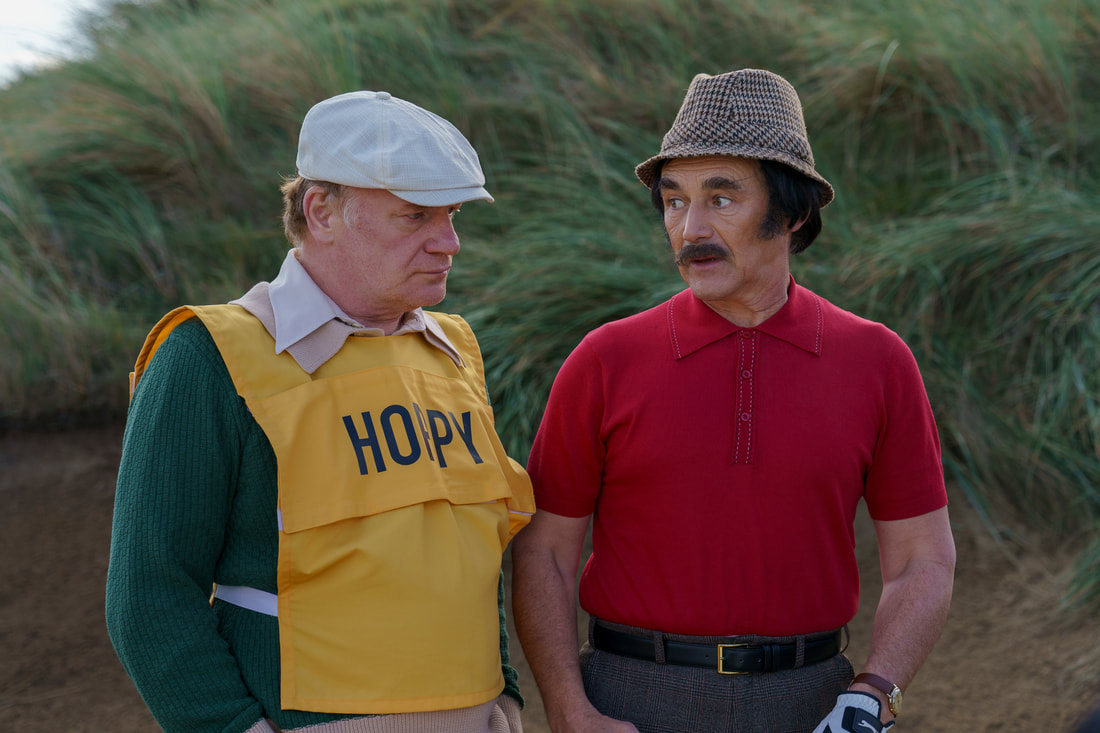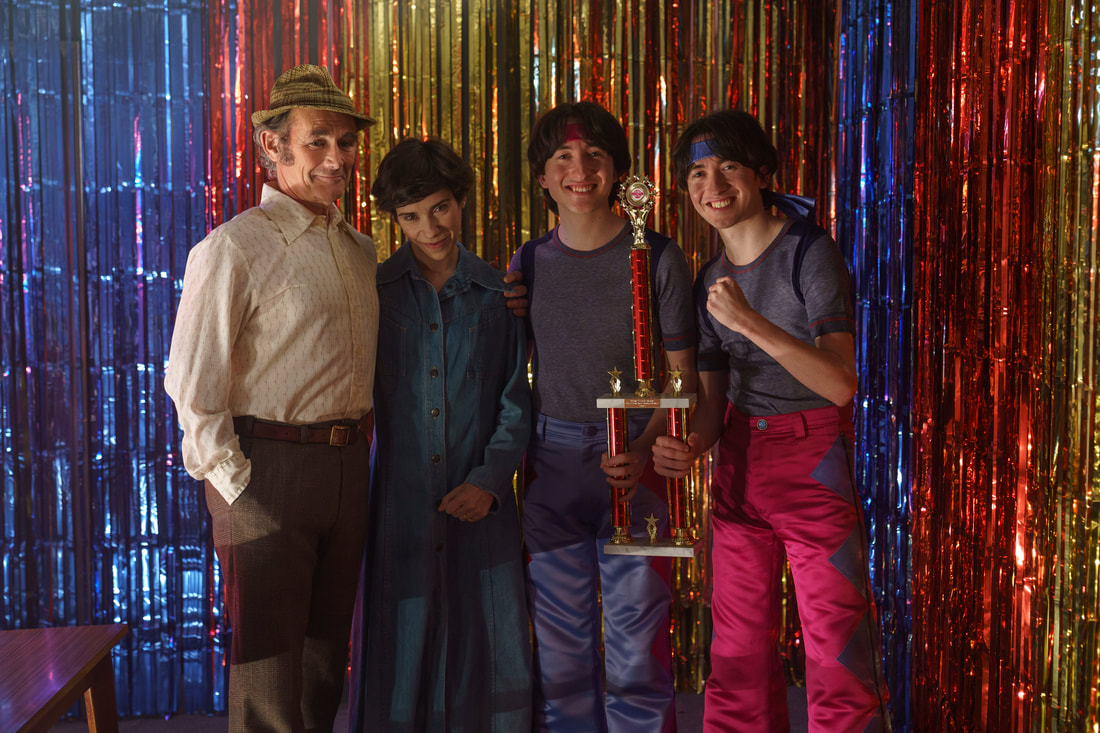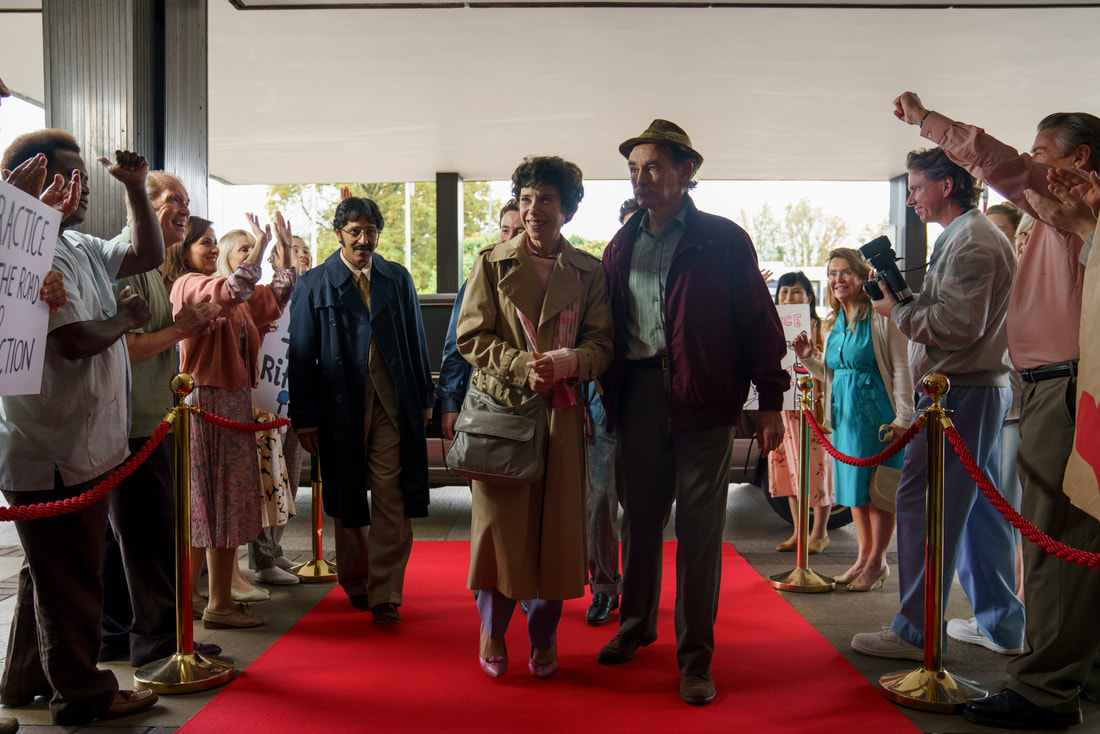|
Interview by Sean Boelman
In the genre community, Peter Strickland is one of the most beloved filmmakers because of his films' unique use of atmosphere and satire. His newest work, the high society satire Flux Gourmet, is perhaps his most idiosyncratic film yet — a truly bizarre blend of gastric distress, dark humor, and commentary on the art world — but it’s downright fascinating to dissect.
We at disappointment media had the chance to speak with Strickland about his film and some of the techniques he used in creating this surreal fantasy. Check out the interview below and be sure to see Flux Gourmet, in theaters and on VOD now! On His Distinctive Use of Sound
disappointment media: Sound is an important part of all of your films, and I would say it's especially important in Flux Gourmet. What do you like most about sonic experimentation in your films?
Peter Strickland: Well, I suppose a little bit just came from watching Eraserhead at quite a young age. I was 16. And that was a huge epiphany for me, because I think prior to that, I was watching, you know, Tom Cruise films, which I still love, but it's just a very different approach to sound in something like Cocktail. And suddenly, sound was not illustrating something, it was actually expressing something. And there was just a complete reversal of how I thought about sound, how it conveyed a state of mind and it really just opened up something that I really wanted to explore, that I felt I could do something with somehow. So yeah, I think I'm still chasing that feeling from watching Eraserhead all those years ago. disappointment: In this film, particularly, I really loved your use of experimental music. What were some of your influences for the soundtrack of the film in that regard? Strickland: Well, it's gonna sound very self reflexive, but we had a band called The Sonic Catering Band. So a lot of it came from what we did. But also, I was listening to Luigi Nono. And we actually played his music for the trips to the shops, especially. I think when the guy who did the eventual music, Roger Stevens, he was using all these gongs and he fed into this 2600 modular synthesizer, the same synthesizer that I think that Ben Burtt used for R2D2. And I think a lot of it also came from bands like White House, Throbbing Gristle, Robert Ashley, even Butthole Surfers. A lot of people were taking found voices coming back from radio phone-ins or whatever, but usually detailing something very disturbing, you know, horrific abuse and so on. So really quite shocking stuff. But there's something very haunting about the quality of the voice, this found voice, and I wanted to try that with the scene in the film, the scatological scene, but I didn't want to have anything where someone is a victim. I wanted to do something else. But it was still very intense. So I wrote something for that and the mixer's friend. He got an actor he knew to record something in German, and we treated it as if it came from some kind of radio phone-in. And so yeah, I think bands like that. On Flux Gourmet's Unorthodox Satire
disappointment: So in the film, you juxtapose this high society institution, with shock value with an almost ribald nature. What made you want to set out on this satirical approach?
Strickland: I guess it's a world I know quite well, both the funding world and being in a band, something I felt quite confident in. Obviously, what you're seeing is not the real world. But I was interested in the whole power play in these arguments and how ego, just like in everything in life, especially politics, how ego just destroys everything. It's very important to take the most ridiculous thing, you know, a tiny change in the flanger. That's all they wanted, it wouldn't make any difference either way. But they lock horns over something so small. So in a way, the flanger was a MacGuffin to explore. Yeah, I guess I was interested in ego, in deceit and how and how people self curate themselves, especially now in the world of social media, how you present yourself, the nature of doing a biopic about yourself, and I wanted to look at the lies, the deceit behind all that. disappointment: And in a similar way, the film has this, you know, very absurd sense of humor on one hand. And then on the other hand, it's very solemn. Why do you think that this balance between the two modes was important to you? Strickland: Well, I wanted to look at stomach issues. We've seen them played for laughs all the time. Fair enough, fine. But I wanted to look at it differently. I think for a lot of people, it's not a joke. It's something very, very, very, very serious. I'm not aware of that having been done before. So as you say, to take something which is normally done as something vulgar or something "frat boy" or funny and give it this laconic, solemn feel. And obviously, it's pitted against all the bickering you see, between the band. How that gels together? I don't know. I'm hoping it works for one audience. But you know, what I'm more concerned about is an audience being with Stones's character, whether they laugh or not at all. The bickering doesn't bother me. But, you know, if they laugh at the Stones character, I feel I've somehow failed. ut someone told me after seeing the film, they said, "Oh, you know, your fart jokes were not very funny." And it's like, "Okay, that was the idea." disappointment: I think that one of my favorite parts of the film is the character work. So you have like, Stones in the film is spatially with the characters, you know, a few steps aside, but also kind of intimately voyeuristic. And I feel like that is also what we feel as the audience. How did you kind of go about building this? Strickland: Very much. He is a narrator, he is a window into their world. But obviously, we're a window into his world. I think what fascinated me was when I make films, sometimes you have, they call them the EPK person, the electronic press kit person, someone who's there to document us filming. And their job is to be invisible. And those characters always fascinate me. Let's take the invisible person, let's put that person on center stage. And he clearly wants to be invisible. That's the whole thing. One, that is his job to be invisible, and two, because of his stomach issues, he's even more motivated that way. And somehow, it's like a centrifuge is just going to suck it into the center by the manipulations of Fatima's character. So that was the thing, he's invisible, but he's unwitting. He ended up in the band, basically, so it's just charting that journey of being someone who is just doing a job, but there's this idea that he is someone who, like a lot of these characters, they're all aspiring directors, or aspiring novelists, and all of us have to do jobs, which are commercial jobs. And I do commercial jobs. I write for other people. So I'm very much used to the idea of putting on a different head. You know, he's there like a tailor. So yeah, I'm just interested in those characters really.
Flux Gourmet is now in theaters and on VOD.
0 Comments
Interview by Sean Boelman
The Overlook Film Festival is well-known among the horror community to be a great showcase for some of the most exciting genre films that you will see all year. One of the films that was set to make its World Premiere at the festival was Swallowed, seasoned horror director Carter Smith’s extraordinarily queer horror flick, and it is quite the film to behold.
We at disappointment media got the opportunity to sit down with Smith in advance of the film’s premiere to talk about the film, seeing penis in horror films, queer representation in horror, and how making indie horror is different than making studio horror. Check out the interview below and make sure to see Swallowed when it comes to a festival near you! On Seeing Penis in Horror Films
disappointment media: So first of all, there's this extraordinary artwork I've been given right before this interview began. What is the nature of this?
Carter Smith: There's an artist that I follow on Instagram, named Christian Santiago and I'm just in love with his drawings. He does these sort of intricate, large scale drawings that are all kind of queer horror based. And early on, I was like, "If I send you the script, would you maybe like, draw a picture? Would you like to do a piece for me?" And so I send the script and he's like, "I want to do something from the bathroom scene. And so this is what he came up with." disappointment: That's awesome. Smith: So you have to include this so people know what we're talking about, hahaha.
disappointment: I was talking about the film yesterday with some people who hadn't seen it yet. One of the selling points was that there is an exceptional amount of penis in the film.
Smith: There is. That was very important from the inception. disappointment: Why do you think that was important? Smith: I spent so many years as a young gay kid, like looking for penis in the horror movies that I loved. And it was never there. I did it to provide for the younger generation. disappointment: And you know, I think that that's something that is really special about indie horror. Like, you've worked in both studio horror and indie horror. Do you think that indie horror gave you that freedom to make those creative choices? Smith: Yeah, I mean, there definitely wasn't anyone saying that I couldn't do something. You know, like when I made The Ruins, there was a scene in the hotel when they're hungover and they're getting ready to go out. And it became a huge discussion and conversation about even showing a guy's butt after it. But yet there was like, mandatory nudity for one of the girls. And like, I don't agree with that at all. And so it was nice to, you know, sort of have a flip side of that, where I could do whatever I wanted. disappointment: Yeah. Do you think that there's this double standard in terms of horror filmmaking and you know, showing female nudity versus not showing male nudity? Smith: I mean, I think it's changing. People are getting a lot more comfortable with seeing dick. And, you know, it's always been butt, but I feel like audiences have gotten a lot more used to seeing at all. On Queer Horror
disappointment: So obviously, this is a very queer horror film. What do you think is the importance of queer genre cinema?
Smith: Just seeing yourself in the films you love. Seeing characters that act like you and look like you and talk like you and love like you, that's super important. And that kind of can't be discounted for young people watching films, seeing themselves is so important. And I mean, sure, you can watch like, you know, awkward coming of age, sort of traditional queer movies. But like, there hasn't traditionally been a whole lot of representation in real genre cinema. So given the chance to, "Okay, go do whatever you want," which this was, I was like, "Okay, this is what I want" disappointment: What do you think some of your favorite queer genre films would be? Smith: I mean, I do have a soft spot for Nightmare on Elm Street 2. If for no other reason, just because seeing Mark Patton in that movie was the first time that I felt like I saw myself. You know, I was a teenager in bumfuck, middle of nowhere, Maine. And there was someone who was like, "Oh my God, he dares to wear that yellow shirt that I wish I could wear to school, but I don't, I can't." So that was a really big one for me. Now there's lots more. Like, I love Erlingur Thoroddsen's movie, Rift, the Icelandic movie. I think also, there's this tendency now that films don't have to be only a queer horror film. Like it can have queer characters that that's not the source of the suffering. It's not the source of the evil. They're just sort of part of the story, which I find really interesting. When it becomes less about someone being queer and more about them just as a fully developed character in an otherwise horrifying movie. disappointment: Yeah, I definitely agree with that. I think that that is kind of the next step for representation. And I think you do a great job of that in this film, how you know, the characters are fundamentally queer– Smith: But that's not what it's about. I mean, it kind of is, because it is sort of a love story. I mean, there is that element to it, but it's not front and center in a way that you might expect. On Casting the Film
Boelman: And you talked about Mark Patton, he's in this film. I absolutely loved his performance. I think it's probably my favorite part of the movie. What was it like getting him to be in the film?
Smith: You know, I wrote the part for him. And having never met him and only after seeing Scream, Queen!, and then, when I wrote it, I was like, "This would be fucking amazing for Mark," And I just sent him a message on Instagram. And was kind of relentless and kept messaging him, and got his email and sent him the script and sent him a package. And he didn't get it at first, what it was all about. He didn't even realize that I was actually offering him a part in this. And when he did, he was kind of taken aback and he was scared to death of it in a lot of ways. Because, you know, it's a pretty juicy part. And in the way we were shooting it with a micro budget, tiny crew, remote, remote, remote. It had a lot of challenges. But he was a trooper, and like, fully showed up. And it was kind of amazing. disappointment: There aren't a lot of movies that have those juicy parts for older queer actors. Can you talk about this film and that role's significance in that regard? Smith: I think that so much of queer cinema, especially, is focused on youth, and coming of age, and like these beautiful boys on swim teams longingly looking across the pool. And that's part of a queer experience. But you certainly don't stop being queer when you're in your 50s and 60s and 70s and beyond. So, I think that, it just kind of goes towards telling stories that are fleshed out with real characters that just happen to be queer. And then it's not necessarily like, why they're in the story, but that's just part of who they are. disappointment: You also have Jena Malone in this film. Yeah, she's great as well. I was actually watching the film, and I'm like, "I wonder when Jena Malone is going to show up?" And then it just dawned on me that it was her because like, her performance was that transformative. Can you talk a bit about her performance? Smith: That’s awesome. Again, she was someone who I wrote with it in mind. The whole project was conceived to be something that I could do with a very small crew and with things that I had access to. I knew that we were already friends from doing The Ruins. And so I knew I could text her, because we talked about doing something and it just hadn't come together yet. It was very much like I wrote it with her in mind, this kind of badass, tough, I don't know how you would describe her character exactly. But she also was someone that, because she's been on sets for so long and she's been working for so long, she helped, in a way, everything that we did, she elevated it. Everyone was like, "Okay, we're on our A-game." Even if it's like Jose's first movie that he has ever been in, for him to be able to watch her and how she works was incredible. disappointment: You mentioned Jose Colon. And Cooper Koch is also a relatively new actor. How did you find the two of them? Smith: Jose, I found. I am also a photographer. I shoot this series of portraits called "All the Dead Boys," and he was someone who I'd photographed for it. And I just found him super interesting. And took the photos, like went off. A couple weeks later, I was editing and it was the same time I was sort of starting to think about the script. And I just had these pictures out. And I was like, "Oh, his name is Dom. He seems like this sweet, potential redneck rural, straight guy with a heart of gold who his best friend might fall in love with." So it was very much written for him which was, which was super exciting for him, but also for me, because I was writing to what I knew. And he was amazing. And Cooper, I had actually met Cooper a couple of years before just sort of briefly. And that was the one role that we ended up like having people put themselves on tape for and actually did a proper little bit of casting. And he was just incredible. It was clear from the very first moment I watched his tape. disappointment: That's a very hard role, obviously. How did you work with him to get through those difficult moments? Smith: I mean, he was pretty game. Everyone knew what they were signing up for it and everyone sort of knew, this was gonna be a really tough shoot. There's a lot of material here that is potentially tricky, and we're gonna roll up our sleeves, and we're gonna get dirty and slimy, and everyone sort of had to sign on to work in that way, before I felt comfortable, saying, "Okay, you're on Team Swallowed." If you have a problem helping to carry our catering in or out of location, we don't want you. You have to, you have to pitch in and help. On the Film's Aesthetic and Atmosphere
disappointment: The whole film has this grimy aesthetic that's very very discomforting. How did you come to build this aesthetic?
Smith: The whole aesthetic is very rural Maine, which is where we shot and which is where I grew up. And just the overpowering beauty of the natural setting in the forest, that was where a lot of it started. And like the camp that we shot at, that's an off-the-grid camp that my dad and he forced me to help him a little bit when I was a teenager. I went begrudgingly, and thank God I did, because now we had a camp that I could shoot at. But a lot of it is for the most part in daylight, so like the sliminess, it's a good texture. Imagine, like when you see a really slimy, weird slug, and it's covered with debris and bits of fur, dead leaves. And there's something about that contrast that I was really fascinated with. disappointment: Something I really loved about the film is that, you know, you've got this atmosphere that's really uncomfortable and unsettling, but you don't really use jump scares. So how did you kind of go about, like, making that tension throughout the film? Smith: I mean, jump scares, I'm not a fan of for the most part anyway. For me, building a sense of dread and unease is always my favorite thing to try to figure out how to do any and every way possible. I think that once you realize what has happened in the film, and what has to happen afterwards, that's uncomfortable for most audience members, I would dare say. So, as much as anything, it's the psychological aspect of thinking that you have to face what these characters go through, it immediately makes people uncomfortable. disappointment: There's a lot of minimalism to the film as well, I would say. You don't show a lot of the creatures, which I mean, part of that, I'm assuming, is probably budget constraints that you couldn't show a lot. But it also makes it more unsettling, I think. Those quick flashes of it let you imagine it. Smith: And they're super simple. The creature design, everything about them is very simple. And from the beginning, I knew that we were going to be limited. We'd be shooting in daylight and we did want to do everything practically. So I knew that was going to be the box that we were playing in. And that maybe we might get a little bit of digital help afterwards if it was necessary, but it wasn't planned that way. It was planned to be 100% practical. And I had met Dan Martin, the special effects designer, here at the Overlook a couple of years ago at the closing party, and we just hit it off. And he ended up doing the creature work on this. And it was super fun to do something practical. Like I've done digital stuff, and I've done some practical stuff, but like a practical creature, I guess if you want to call it a creature, was really fun. Because it was practical, there's a lot of clamps and springs. And then you get these cramps in your hand from puppeteering. I still have carpal tunnel from puppeteering the creatures. disappointment: I also really liked the cinematography, the aspect ratio was very small and I would say claustrophobic. Can you talk a bit about that? Smith: I knew I wanted it to feel super claustrophobic. Not only are they sort of trapped for the second half of the movie in this little cabin, surrounded by nothing but open space, I liked the idea of shooting in that aspect ratio. And because also, a face looks so good in that ratio. To me, a close up works so much better when the film is in 4:3, it looks so great in 4:3. And, you know, widescreen or 16:9 or any other formats, it starts to be less impactful in a lot of ways. And knowing the room that we were going to be in a lot of the film, I was like, "Okay, I'd rather have a frame full of face than a frame with 1/3 face and two thirds of this room that's going to get boring to look at." And Alex Wolf Lewis, who shot the film, he's actually a documentary shooter. This is his first narrative feature. He's very much used to kind of going into a space, not lighting it, following whatever happens and shooting it that way. So that's how we approached it in the film. disappointment: On one hand, this film is very grounded, you've got the thriller elements, like the crime elements that are very grounded. And then you have this kind of sci-fi/horror thing in it. How did you find the balance between the two to make it so unnerving? Smith: I always felt like the, the natural, the sci-fi element to me it's actually not that sci-fi because it's 100% plausible, right? There are, there are so many versions of natural animals, venoms, that people have been taking, ingesting, using, injecting for hundreds of years. So, to me, it's less sci-fi and more a strange northern Maine drug subculture. But I knew that none of that stuff would work if the rest of the film wasn't pretty grounded, both in character and reality and the textures, all the locations. It was all very real. And that's kind of what we set out from the beginning to make sure so that when things go a little crazy and get a little less real, you buy it in that world.
Swallowed premiered at the 2022 Overlook Film Festival, which ran June 2-5. It can next be seen at the Fantasia International Film Festival in July.
Interview by Sean Boelman
The Phantom of the Open debuted at last year’s BFI London Film Festival to great acclaim. Written by Simon Farnaby (Paddington 2) and directed by Craig Roberts (Eternal Beauty), the film tells the unbelievably true story of Maurice Flitcroft, a man who entered the British Open despite not being a professional and ended up scoring the highest round in the history of the tournament.
We at disappointment media got the opportunity to talk with Farnaby and Roberts in advance of the film’s release. We talked about golf movies, the Flitcroft family, Paddington 2, and more. Check out the interview below and make sure to see The Phantom of the Open in theaters beginning June 3. On Golf in The Phantom of the Open
disappointment media: So what are some of your favorite movies that feature the sport of golf?
Simon Farnaby: Oh, good question. I mean, Caddyshack is probably my favorite. Yeah, but Craig and I disagree a lot over Happy Gilmore. I usually love all the films that Craig loves, but I really hate Happy Gilmore. And I think I hate you because I don't think it's a golf movie. I think it's a hockey movie. Craig Roberts: Yeah. I think you're right. If you look at it that way, it's brilliant. Farnaby: But I'll tell you something, which is that I grew up around golf and I love golf, and always sort of wanted a good golf movie that did golf some justice in terms of this sort of competition of it. I mean, Tin Cup got pretty close. But I always went, "Why do these courses look so shit?" Like they don't look like that. Championship courses look a particular way. And they never ever look like that on screen. And when we shot this movie, I realized why. Which is because no members will let you shoot on their course, no matter how much money you throw at them. Because they just don't want their golf club to close for even like half a day. Roberts: And it makes it difficult because you also can't get the equipment onto the greens. That was certainly a challenge. Farnaby: So I really had a lesson there on why they look like that. I mean, actually one of the courses looks great. On the Lynx course, Danny Kent looks amazing. Although the wind was howling, and no one could stand up. disappointment: Something in a film like The Phantom of the Open, you actually kind of have to make the sport scenes look unprofessional, because it's about someone who is not very good at golf. Was this a challenge? Roberts: Well, it's just him that's not very good. So I suppose the biggest challenge with golf is that if you love golf, which a lot of people do, then it's fantastic. But then a lot of other people don't love golf as well and they find it boring. So for us, it was about keeping it interesting and entertaining. And you know, somebody who stood in the middle of a green field can get boring very quickly. So we just wanted to make sure, I suppose, that the camera moves and all that just matched his energy, you know, and his drive. And that was difficult keeping that going. Farnaby: Actually, you know, showing bad golf is easier than showing good golf because of the shortness of the shot. Roberts: That's true actually, yeah. Farnaby: Sometimes what people struggle with watching golf on TV is that you can't see where the ball is going. Because they hit it so far. But Maurice didn't do that. So we didn't have to deal with that problem. On the Flitcroft Family
disappointment: Something else that I loved about The Phantom of the Open is that just as much about family as it is about golf, how did this theme resonate with you?
Farnaby: Yes, it was. You know, Maurice and his wife, Jean had a very special relationship and the boys, you know, the twins and Michael, Maurice's stepson. So, in a way that was, as a screenwriter, the thing to get right. It's not really about golf, it's about a family, you know, and those characters and how they interact and what their sort of family philosophy is, and all that sort of stuff. And then when Craig came aboard, Craig was really into all that as well. And even more and going look, let's get this relationship right. And then getting Sally Hawkins, who can really hold up. In real life, Jean was Maurice's rock, and Sally managed to do that sort of brilliantly. So yeah, it's a good spot. It's very much about family. Roberts: The way I look at it is that it's about somebody who's trying to defy the odds that he's given. You can't do that without his family at all. And certainly without Jean. I think as confident he is that he wants to do it, I think she believes in him more than he probably does as well. So that's a really powerful thing to have, you know, and it's helped many, many people throughout history. I think that's important to reflect. disappointment: So one of my favorite bits in the film was the Fantastic Flitcrofts, the dancing twins. How did you go about incorporating this absurd and charming duo into the film? Farnaby: Well, it was a great thing to have because they were genuinely world champion disco dancers, you know, Maurice had this philosophy that you see in the film of you know, just try and it doesn't matter if you fail. And they, in a way, are a part of that debate because they did try and then they succeeded. But they succeeded at something that had a very short life span, which was disco dancing, which died in the mid '80s. So it was great to have that because a film is kinda like a debate, sometimes I think, and it's good to have all the different elements of that. And they were part of that, and it was real, I was lucky enough to meet them. I mean, James is still alive and is in the film, actually. But I met Jean and James together when I first did the research for the movie, and they're really amazing characters and actually danced everywhere that they went and make a cup of tea and they go and dance. Roberts: Christian and Jonah, we were very lucky to get them to be honest. We were about five weeks out from shooting, and I was panicking. But as soon as I saw the video, they sent a kind of an improv dance and then some acting self tape. And first off, they look like I don't know if you know the band The Last Shadow Puppets? It's Alex Turner and Miles Kane. And they kind of look like them. Like a funny version. Loved that. And then I Skyped with them when they got out. And I just love their energy so much. It kind of you know, that's how Boogie Nights feels. disappointment: And I mean, as a whole, I think the cast in the film is phenomenal. I mean, you have Mark Rylance, Sally Hawkins. What was it like working with the cast to bring the Flitcrofts to life? Roberts: It was a dream. It's the hardest part of the process, getting that right. Because, you know, you can shoot on the best cameras in the world. But if you don't have good actors, your movie's doomed. If you have a great actor or an iPhone, it's going to be a better movie. So getting that right is hard. But really satisfying once it comes together. When it came together for me was actually when we did a bunch of rehearsal for that. I never really rehearse to get it right. It's kind of to get it wrong and get all that out, really. But when it came to the first thing we had as a family, it was the scene where everybody was talking over each other. The dog was barking. And I kind of said to the actors that I kind of want it to feel like Uncut Gems, that Safdie Brothers movie. Just complete chaos. And weirdly, because they all could just talk over each other. I think it was very freeing for them. You could feel the chemistry and they all came together in that moment. disappointment: So do you have a favorite alias that Maurice Flitcroft used? Farnaby: Oh, God, I mean, Arnold Palmtree obviously, and I do think Count Manfred von Hoffmanstel. Like why put Count on it? And what Count has ever played golf? I mean, I've never seen Count in front, like that was an odd one. But Gene Paycheki-- Roberts: That's pretty good as well. I like Hoppy. Gerald Hoppy. On Paddington 2 and Heartwarming Stories
disappointment: Mr. Farnaby, Paddington 2 is a pop culture phenomenon. It was even a plot point in The Unbearable Weight of Massive Talent that came out this year. But did you ever expect that film to be such a smash?
Farnaby: No. Actually, I haven't seen the film yet, The Unbearable Weight of Massive Talent. [to Roberts] Have you heard about this? Roberts: No, I didn't. Farnaby: I'll show you it in a bit. I've got it on my phone. And somebody sent me a clip of it. And both Paul King and I had a little chat and said it was almost the thing that made us most proud of the movie. Because like you say, it's become pop culture. And I had so many texts, and for so many people, that's their favorite bit of the movie. But we knew that the plan was to try and make two better than one. That was the goal we gave ourselves. And it was quite a hard thing to do, because it was really loved the first one. And so we really gave ourselves a tough job. But you know, it took us about two years to write it. And I think we put in a lot of effort. So it was nice to see it sort of come off. Maybe that's just how long you need to spend writing films. disappointment: Well, like Paddington 2, I would say The Phantom of the Open is like this heartwarming, crowd pleasing, inspiring story. What stands out about these types of stories to you? Roberts: Well, for me, it's escapism, isn't it? That's the important thing. I think cinema at its core, sure, should reflect society and all that stuff. But I go to the cinema to escape and to feel good. It's the kind of the Spielberg/Kubrick debate where you can go to a Kubrick movie and come out questioning the world and yourself, or you got to a Spielberg movie and come out and feel great and warm. And at this time in my life, I want to feel warm. And I think that's what's important. Farnaby: Yeah, and I like characters that sort of reflect our fears, but don't have the same sort of reactions to them. For example, you know, I think we're all slightly frightened of failure, you know. And I say this to my daughter who's eight all the time, she tries things and is sort of scared to fail. And it's really important to go, it doesn't really matter if you fail, or like, somebody said, "Failing is success, part one," or something I don't know. I think I just said it, I forgot the quote. Craig and I even talked about The Big Lebowski, we both love The Big Lebowski, and that's got bowling in it, and this does golf. And as a character, he's sort of confident in his own lifestyle. And is fine with it, you know, and Maurice just went for it. He had this character that was like, "I'm gonna take my dream, and I'm gonna go for it, no matter what people think of me." And that's something that I think we like to see, you know, because we're so frightened of it ourselves. And we like to see people doing that and we can laugh and cry at that person, because it's a real hero's effort to do that, you know? Whereas most of us just go, "I'm not going to try anything in case I fail." On Executing the Film
disappointment: Mr. Farnaby, you adapted the script from the book that you co-wrote, what was that process like for you?
Farnaby: Yeah, it was fine. Because I'd written the screenplay before I wrote the book, actually, and the screenplay was not very good. And then I did the book. You know, everyone should write a biography first, if they're gonna do a screenplay, because you just find out so much stuff. You know, you've got to do 50,000 words on one person. And then it's just a case of, I call it kind of like curating those elements into what I know about crafting screenplays. So it's actually a much easier process than doing straight fiction, which can go in any direction. And you just have to keep going down blind alleys. But this had lots of elements. I mean, the main difference to the bullshit screenplay I wrote, and the final one was, was finding an ending, because it's quite hard to write a sports movie where the person doesn't get any better at the sport. But what he does is find success in another way. And his sort of trip to the USA, was something that nobody knew about. It wasn't in the obituaries. And it wasn't in the newspapers. And that was all from digging in and going and doing research. And that gave us the end to the movie without giving too much away. Yeah, like you say it was once I'd sort of gone through the pain of researching and writing the book, the screenplay was fairly straightforward. disappointment: I want to talk a little bit about the dream sequences in the film. I thought they were gorgeous. What went into creating those? Roberts: Well, they were there already to be honest, they were in the script. The whole Starry Night aspect of it was there. So it was basically finding a good team that could execute it and bring that to life. And finding the right color palette for it all really. It was important, I think the escapism of it all. He wanted to, you know, to break out and do something that the people were telling him he couldn't do. So I think they're important to have in there. And when I read it, that's what really attracted me to the script. It kind of felt like The Big Lebowski, him walking up the steps. So that was really fun. Farnaby: Yeah, I mean, Craig's being very modest. I wrote those because I wanted them and it was like a Billy Liar type thing. But that's why I'm not a director, because I wouldn't have had a clue. I was like, that's what I want. There's a dream sequence. But I didn't have a clue how to do it and actually created it brilliantly. I mean, even when he's on the tee and he hits his shot. And you see it from the ball's eye point of view. I was like, I have no idea how I was gonna do this, but I believe Craig pioneered a new type of shot, right? Roberts: I didn't need to, I took it. Farnaby: Oh you stole it? Roberts: Yeah, from Simon's favorite film. I took it from Happy Gilmore. [They laugh]
The Phantom of the Open hits theaters on June 3.
|
Archives
March 2024
Authors
All
|
|
|
disappointment media
Dedicated to unique and diverse perspectives on cinema! |

